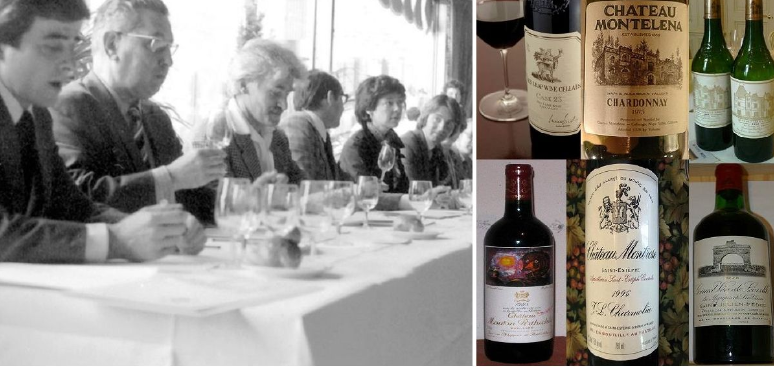
If we wanted to give a date to the birth of modern wine criticism we could state 1976, the year in which a well-known British wine merchant organised the tasting that became famous with the name of “The Judgment of Paris”. 11 experts of French wine, chosen among the most illustrious names, were called as tasters to this event. The purpose of the tasting was to introduce Californian wines, both white and red, by comparing them with the famous French wines of well-known Maison.
Steven Spurrier, a British merchant, would never have imagined that this tasting and above all the result that ensued would change the world of wine forever. Wines were compared in a semi-blind way, i.e. the tasters knew the labels to review but did not know in which order they would be served, since the bottles were covered and therefore not recognisable.
Ten Chardonnay and Ten Bordeaux cuts based on Cabernet Sauvignon were judged equally divided between California and France. The result was devastating for the French: among the whites the Chardonnay Napa Valley by Chateau Montelena won and among the reds the cabernet sauvignon by Stag’s Leap Wine Cellar also from Napa Valley.
From this date on, Californian wines began to be considered and also wines from other areas of the world that had not yet come to the fore, including Italy.
In 1978 a young American lawyer with a passion for wine, named Robert Parker, founded a magazine called The Baltimore-Washington Wine Advocate which the following year took the simpler name of The Wine Advocate. He did not have a great following for the first few years, but he did not give up and concentrated on the tasting of Bordeaux and California wines, achieving excellent results. Meanwhile, Parker had already created a small revolution by changing the wine rating scale. Before that, wines were judged on a 20-point scale while Parker gave rise to the score in cents, which from then on was the primary method of evaluation. The turning point came in 1983 when he published his scores on Bordeaux wines of the 1982 vintage. The vintage under review was considered by all reviewers of the time as modest and not prone to aging. Parker instead welcomed it as grand and long-lived … history will prove him right. The 1982 vintage is still considered one of the greatest of the century and the Bordeaux of this vintage are still highly sought after. From that moment on, Parker became the “Guru” of wine, having the power, with his scores, to change the commercial fortunes of entire wineries and even entire wine regions. Considered by many to be the cause of the rise in the prices of the great wines of Bordeaux and California, it was repeatedly accused of dubious impartiality towards some Maisons. One thing is certain, without him the world of wine probably would not have been the same. In 2012 he took a step back and left the management of The Wine Advocate to Lisa Perotti Brown, then chief editor. In 2017 it sold 40% to the Michelin group which completed the total acquisition of The Wine Advocate in 2019. Robert Parker retired, no longer dealing with wine except to drink the great wines of his immense private cellar.
Other important names in today’s wine criticism include:
Jancis Robinson: undoubtedly the most important woman of wine, the first Master of Wine* in the world who did not come directly from the trade or production of wine. Curator of a very famous weekly column on Financial Time and consultant for the cellar of the Royal family. Together with Hugh Johnson she wrote Atlas of Wines of the World, considered by many to be one of the most important books on wine, with dozens of reprints around the world. The only one among the wine journalists to give scores in twentieths.
Neal Martin: after travelling the world as the manager of an important multinational in Japan, he began working with a well-known wine importer. From that moment his passion for wine was born, which led him in a few years to become one of the most influential pens on the world scene, to collaborate with Robert Parker and then to become Senior Editor of Vinous. He was recently elected as the most influential critic for Bordeaux wines by a panel of prominent wine merchants.
Antonio Galloni: do not be influenced by the name, Galloni is American and is considered one of the most influential wine critics in business. Great connoisseur of Italian and French wines. In love with Piedmontese wines, he has certainly helped Barolo and Barbaresco to reach the international stages they have long deserved. He has collaborated for many years with Robert Parker and in 2013 he founded his own magazine called Vinous in which he offers great space for Italian wines.
James Suckling: American based in Hong Kong for many years. After a long career for Wine Spectator magazine, in 2010 he founded his web portal: jamessuckling.com, where wines from all over the world are reviewed. Together with Antonio Galloni he is the most illustrious supporter of the quality of Italian wines. Suckling is also very popular in the Asian market, having lived in Hong Kong for many years.
Richard Juhlin: Swedish critic specialising in Champagne. Unanimously considered the most important populariser and taster of French bubbles. Thanks to his website, The Champagne Club, he has been talking about Champagne for years and publishing his tastings. In his career he has tasted more than 13,000 champagnes, often in incredibly old vintages. In 2013 he received the “Legion of Honour” from French President Hollande for his tireless promotion of Champagne around the world.
*British Association for Professional Wine Training, internationally recognised